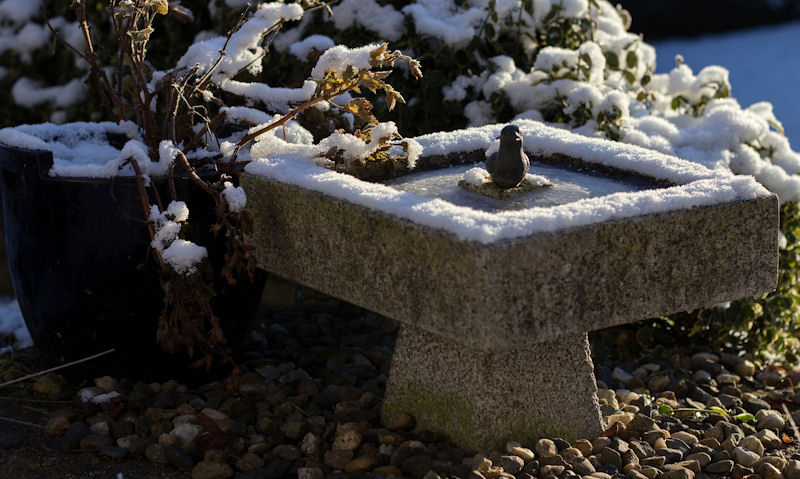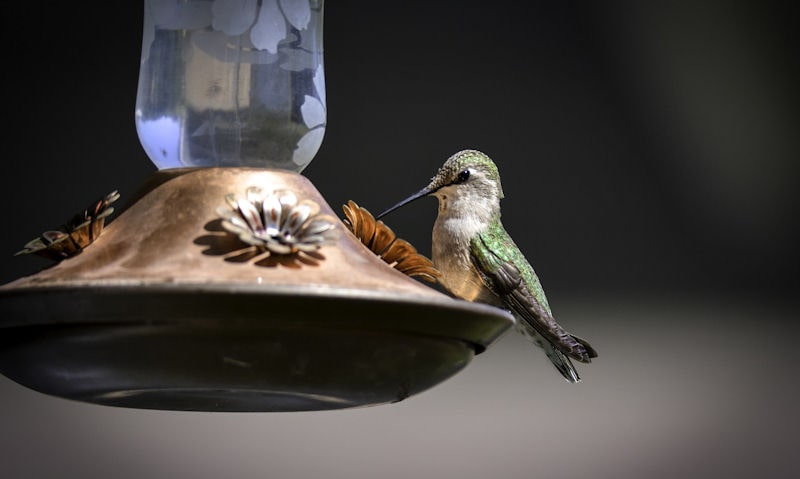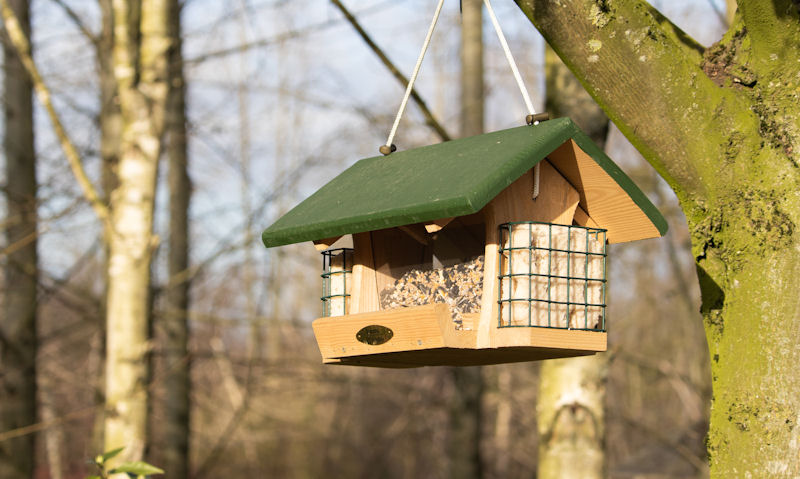What to do with bird bath in winter
Its normal to believe a bird bath needs little to no attention in winter, when in fact its the opposite, as a bird bath is likely to freeze over in cold conditions.
What you do with a bird bath in winter is to use it as you normally would in the warmer months. Birds will want to use your bird bath and when they do, it mustn't be frozen over, nor should it lack a regular cleaning schedule. De-ice or brush of snow when you can, whilst keeping the water topped up with fresh.
What goes on in peoples heads when approaching winter is that your bird bath will now be used less, then when it was at its prime in summertime.
Well, the truth is wild birds need a fresh water source all year round - despite an obvious decline in winter - as birds can struggle to access water in nature that can ice over or completely freeze up in sub zero conditions, which applies to many States.
What's different now is you must continue to clean and change the water source, all while making sure the water remains accessible.
Birds do use bird baths in winter time, though any snow or ice could hide a bird bath, along with the bird bath color theme looking less vibrant; its vital to utilize running water features like a fountain to get birds attention, as to attract wild birds to your bird bath.
You will continue to use a bird bath like you always have despite what time of year it is.
During winter, time can be spent brushing off snow in and around the bird bath on a daily basis; while more difficult work can be carried out whenever you attend to the bird feeders - which will also need clearing of snow and ice.
It can be less satisfying operating a bird bath in winter for many, as its seen to be used less - although when birds do come calling, all that work will pay off for you.
Bird baths continue to be a good idea to use in winter, just as they are in spring or summer, with birds finding it difficult to hydrate or preen if water freezes up in the wild.
Continue to use as normal
Much like feeding wild birds a range of their favorite bird food in feeders all year round, come winter birds will continue to be attracted to a bird feeder as they always have.
It could be iced over or it may be snowed covered, regardless a wild birds behavior will see them seek out bird feeder food, and on occasions what will probably be an frozen over bird bath.
Do continue to use a bird bath as you normally would while concentrating your efforts in ice prevention.
Bird baths will sustain fresh water yet the sub zero conditions will quickly cause water too turn to ice or completely freeze over.
You will have to commit on your part to at least keeping and eye on the water condition, making sure its readily available with no ice or snow coverage.
You could utilize what is a heated bird bath which will maintain an ice-free water source, whereas anyone who favors a normal bird bath with no intent on using or at least are unfamiliar with the difficulties of dealing with bird baths in winter, can pop a bird bath heater in the water, which will prevent snow or ice building up.
Bird baths made with an heater are safe to use but should really only be turned on once in a while during the cold winter months.
Continue to use a bird bath as normal for the time being then, whilst maintaining a clean bird bath whilst changing out water like you would in the warmer months.
Birds will cope on their own
With all that being said, our most common bird bath birds like Cardinals, Bluebirds, American Robins, Sparrows and many more, have all evolved to deal with an iced-over or covered in snow bird bath in winter, despite the difficulty.
Birds can drink a little water that is available above the ice, whereas to bathe could be made harder, thus birds will be seen to delay pruning their feathers.
This isn't to say you shouldn't assist birds in their efforts to drink and bathe, and in the harshest of winter, you really should be helping them daily.
Birds who frequent our yards can still get water droplets with melted ice or snow, or shallow ponds or lake sides may still be available to them - including public fountains and ponds in town.
While bird baths aren't seen to be used as often as one would like, you could actually see an uptake in wintertime as birds scramble to hydrate, so stay prepared.
Now that you're long out of the summer months you can re-locate your bird bath out of the shade where it was once hidden from direct sun - to an area of the yard that is now in direct sunshine.
Birds are likely to spot a water source in winter conditions if its out in the open, and therefore in a lit up area where birds can spot it.
On the plus side, any winter sunshine can speed up the defrosting process whereas the shaded area remains iced up or snow stays on the ground.
Refresh water once in a while
While you continue to use your bird bath in wintertime as normal, its imperative you continue to prioritize your common backyard birds health.
With that in mind, you must be sure to replenish your bird bath with fresh water as often as you can, like two or three times a months now you're well into winter.
Sun and heat can speed up the germination process in and around a bird bath - including the growth of algae - yet the cold winter can slow this process down, but it will eventually happen if left unintended.
What to do then is to wait until its not super cold or snowing out, to be able to uproot your bird bath setup to clean it out, but more importantly to replace old water for new.
Don't delay changing out water in the winter because its naturally refilled with rain or melted snow; bird baths must still be cleaned out to prevent bacteria brought into this shared water source.
You don't have to replenish with fresh water all the time as this time of year can at least assist you - but you will need to make way for cleaning the bird bath of algae and debris.
Maintain cleaning schedule
Now that you've decided to use your bird bath in winter like you always have, don't skimp on a regular cleaning schedule.
As it happens you may not have a choice, because a bird bath left out in your yard all year round will see it fill up with rain water, plus melted snow or ice throughout... thus it will force you to clean the bird bath unless its packed away and taken indoors.
Maintain a proper cleaning routine that doesn't necessary need to be as regular, but once in a while to kill any germs or the development of algae is a must.
Utilize a snow or ice-free bird bath water feature by making use of common devices to keep bird bath water running, like a fountain feature.
If you decide to actively use your bird bath in winter, you can use a fountain which birds will love because they can both hear and see it, as oppose to unseen or heard still water.
Bird baths will freeze over in winter even if its a thin ice sheet, and while birds can still hydrate they can't bathe, which they must.
With all that to consider, it should keep you on your toes with a regular cleaning schedule, as you'll know wild birds won't be able to access the water if delayed or ignored.
Conclusion
What you would do with a guaranteed crack-free stone bird bath in winter is use it as you normally would, because all your wild birds will need to hydrate and bathe just as they do any other time of the year.
In fact, wintertime may be more important as those small leaf rain droplets or puddles birds normally drink out of, will freeze up in the cold.
Continue to use your bird bath like you always have, knowing you'd have to deal with ice and snow coverage - with the rain at least replenishing the bowl.
Birds can cope in winter with no big deal, but in reality their water sources do freeze up more often; thus a bird bath that is de-iced with snow brushed off being their last resort, or else birds will struggle if they can't hydrate or preen.
With the bird bath probably used as normal then - however less or more that is - do refresh the bird bath water like you always have.
Not before cleaning the bird bath up to three times a months in order to kill off bacteria while preventing algae.
Its easy to believe a bird bath doesn't need any attention in wintertime because of the abundance of rain water, when in fact natural water resources can freeze up.
When you see plenty of rain in winter its easy to ignore a regular cleaning schedule, even in cold conditions the bird bath can become a breeding ground for bacteria so its important to be very strict with hygiene.


